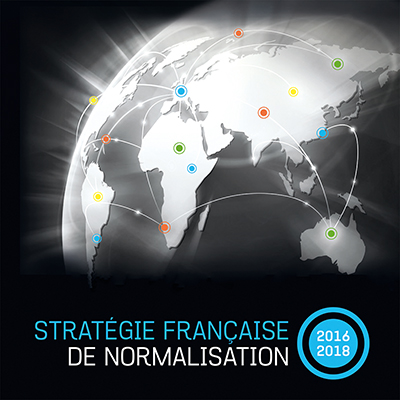Headlines
Back > Headlines

A new French strategy towards standardisation
The AFNOR standardisation management and coordination committee has revealed the main lines of the French standardisation strategy for the period 2016- 2018.
Two major societal priorities, eight across-the-board topics and five specific topics cover the main lines of the French standardisation strategy between now and 2018 issued by the AFNOR referral body, the Standardisation management and coordination committee (Comité de coordination et de pilotage de la normalisation - CCPN). This strategy, working via federation, aims to promote national interests, in France and internationally. This strategy therefore encourages French contributors to consider an appropriate position and an action plan. Over and beyond a coherent overview of the challenges which the key contributors to ground-breaking standardisation will face, this strategy lays down potential lines for the future. The strategy for 2016-2018 also incorporates public policies, binding the guidelines of the AFNOR strategy committees, particularly for multi-sector topics. These policies start with the Industry of the future (Industrie du Futur) plan and the energy transition act, all aiming to ensure consistency with standardisation work.
More precisely, the commissions of the Standardisation office for the mechanical engineering industry (Union de normalisation de la mécanique - UNM) are particularly focused on three priority topics.
3 topics for the UNM commissions
The CCPN therefore launched a brainstorming session on the two main societal priorities, social digitalisation and the digital economy on the one hand, and the climate and environment on the other hand.
Both of these items are imbricated in eight across-the-board topics: the silver economy, the digital economy, the collaborative economy and the sharing economy, smart sustainable towns, services, the energy transition, the circular economy and the plant of the future. The strategy is clear for all of these topics. The strategy describes priorities, provides information on the strategy of French stakeholders and sets targets. The last three topics are of particular interest to the UNM committees.
The plant of the future topic relates directly to the national plans implemented in operational terms by the “Alliance Industrie du Futur”. Eleven priorities have been adopted for this topic. Just like additive manufacturing and collaborative robots, the standardisation requirements of the other nine priorities must be identified, particularly to meet the need for a common language, measuring tools, methods, technology transfers, personnel qualifications, etc.
This provides an opportunity to establish a ground-breaking strategy in the field.
Information on existing standards must be collected in for the topics to be covered by the work. The main aim is to identify the main industrial operators, their priorities and their needs. And much more, as it is just as important to clearly identify the responsibilities of French stakeholders at international level and ground-breaking standardisation work in order to expand on the topic. Studying and, if necessary, preparing the proposal for new subjects or creating a new technical committee, amplifying the contributions of experts and seeking out partnerships, if necessary, are also critical factors.
More information is available from www.unm.fr
- Cegelec CEM selects AFT/Fathom to optimise its nuclear cooling systems Optimising the sizing and design of nuclear equipment cooling systems requires appropriate high...
- The European project EASI-Stress is launched ! Residual stress is easy with the EASI-Stress project! The general objective of the European pro...
- An International index for ISO 128. The ISO 128 series of standards has been given a makeover. Indeed, some parts of the standard a...
- A 1D simulation tool for Getinge Lancer. With the help of a calculation tool requiring no expert knowledge in hydraulics, developed by C...
- Duplication of a Renault wear test bench. At the request of Renault, Cetim has duplicated a test bench for the characterisation of fricti...















